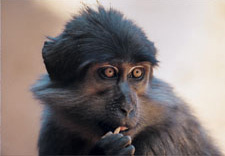
In early 2012, Yerkes researcher Zach Johnson and colleague Steve Bosinger established a new genomics core at the Yerkes National Primate Research Center. The new core has since provided genetic information for more than 30 research projects and has moved Yerkes to the top echelon of primate centers with detailed genetic characterizations and pedigrees for all species housed there.
Knowing genetic differences and similarities among the animals matters a lot, says Johnson. Take, for example, sooty mangabeys. Yerkes has the world's largest breeding colony of these superstars in AIDS research. Sooty mangabeys are one of a handful of monkeys that naturally become infected with simian immunodeficiency virus, from which HIV evolved. Infected humans develop AIDS. Infected mangabeys carry high viral loads of SIV but remain healthy.
Researchers like Guido Silvestri, head of the Yerkes Division of Microbiology and Immunology, in which the genomics core sits, want to understand how sooty mangabeys evolved to do that, knowledge that could lead to development of new immune-based therapies for humans with HIV. Johnson provides Silvestri and others the genetic characterizations they need. He also is working with Baylor's Human Genome Center to sequence the sooty mangabey's genome, an accomplishment that will help researchers worldwide.
 | |
| Zach Johnson |
As a key member of the Yerkes colony management group, Johnson also uses genomics technology to obtain genetic information on paternity and other familial relationships for each of the 300 animals born there each year. This information, used to develop breeding plans to maximize genetic diversity and health, is especially important for mangabeys, an endangered species whose natural habitat is disappearing.
Johnson's own research is a good example of how the new core helps researchers. He and colleagues Mark Wilson and Jenny Tung study how stress changes gene expression (production of proteins) and how such changes affect tissues or bodily processes. One study found that when socially subordinate animals are continually stressed by more dominant animals, genes related to inflammation are expressed at a higher level, with negative implications for immune, cardiovascular, and other functions. Another study focuses on how diet and stress interact to influence genetic expression, contributing to the onset of obesity. Johnson also is looking at genetic differences in the bacteria that populate the guts of obese versus skinny rhesus macaques.
Other researchers turn to Johnson and Bosinger when they need genetic information for studies such as those on how the malaria parasite changes during different stages of infection or which genes are expressed differently in response to different vaccines, resulting in helpful or harmful effects. The growing genomics core currently consists of Johnson and Bosinger, a bioinformatics specialist, and two lab technicians.
After completing his PhD in genetics and neuroscience at the University of Texas in 2009, Johnson joined Yerkes as a postdoctoral fellow, looking at genetic mechanisms that influence behavior, stress phenotypes, transplant success, SIV/AIDS progression, and memory. He stayed as a research associate and was named assistant research professor last year. Today, although most of Johnson's days are spent writing grants and papers and meeting with scientists in search of genetics/genomics help, he still loves the hands-on time with animals at the field station and the occasional trip he makes to Africa, most recently to collect genetic data from baboons, the subject of his doctoral dissertation. But what he loves most, he says, is working in an area of science—and in a place like Yerkes—where real discoveries can take place in today's world.
